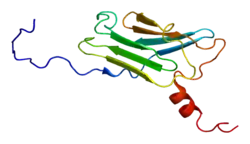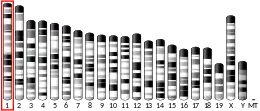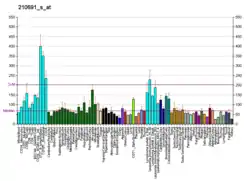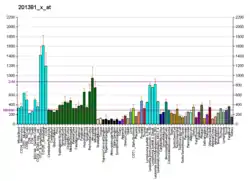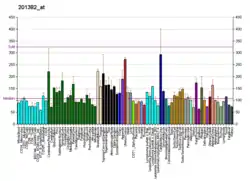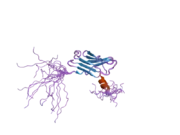CACYBP
Calcyclin-binding protein is a protein that in humans is encoded by the CACYBP gene.[5][6][7]
The protein encoded by this gene is a calcyclin binding protein. It may be involved in calcium-dependent ubiquitination and subsequent proteosomal degradation of target proteins. It probably serves as a molecular bridge in ubiquitin E3 complexes and participates in the ubiquitin-mediated degradation of beta-catenin. Two alternatively spliced transcript variants encoding different isoforms have been found for this gene.[7]
Protein Interactions
CACYBP has been shown to interact with SKP1A[8] and SIAH1.[5]
The CacyBP/SIP complex instead, is known to be a part of stress respons, since it interacts with chaperone HSP90.[9]
References
- GRCh38: Ensembl release 89: ENSG00000116161 - Ensembl, May 2017
- GRCm38: Ensembl release 89: ENSMUSG00000014226 - Ensembl, May 2017
- "Human PubMed Reference:". National Center for Biotechnology Information, U.S. National Library of Medicine.
- "Mouse PubMed Reference:". National Center for Biotechnology Information, U.S. National Library of Medicine.
- Matsuzawa SI, Reed JC (May 2001). "Siah-1, SIP, and Ebi collaborate in a novel pathway for beta-catenin degradation linked to p53 responses". Molecular Cell. 7 (5): 915–26. doi:10.1016/S1097-2765(01)00242-8. PMID 11389839.
- Matsuzawa S, Li C, Ni CZ, Takayama S, Reed JC, Ely KR (January 2003). "Structural analysis of Siah1 and its interactions with Siah-interacting protein (SIP)". The Journal of Biological Chemistry. 278 (3): 1837–40. doi:10.1074/jbc.M210263200. PMID 12421809.
- "Entrez Gene: CACYBP calcyclin binding protein".
- Matsuzawa SI, Reed JC (May 2001). "Siah-1, SIP, and Ebi collaborate in a novel pathway for beta-catenin degradation linked to p53 responses". Molecular Cell. 7 (5): 915–26. doi:10.1016/S1097-2765(01)00242-8. PMID 11389839.
- Filipek, Anna; Leśniak, Wiesława (2018-12-29). "Aktualny pogląd na komórkową funkcję S100A6 i jego ligandów, CacyBP/SIP i Sgt1". Postępy Biochemii (in Polish). 64 (3): 242–252. doi:10.18388/pb.2018_136. ISSN 0032-5422. PMID 30656909.
External links
- Human CACYBP genome location and CACYBP gene details page in the UCSC Genome Browser.
Further reading
- Filipek A, Jastrzebska B, Nowotny M, Kwiatkowska K, Hetman M, Surmacz L, et al. (June 2002). "Ca2+-dependent translocation of the calcyclin-binding protein in neurons and neuroblastoma NB-2a cells". The Journal of Biological Chemistry. 277 (23): 21103–9. doi:10.1074/jbc.M111010200. PMID 11927578.
- Liu WX, Wu J, Zhao Z, Zhou Y, Peng XZ, Yuan JG, Qiang BQ (March 2002). "[Cloning and expression of human calcyclin binding protein (hCacyBP) gene]". Sheng Wu Hua Xue Yu Sheng Wu Wu Li Xue Bao Acta Biochimica et Biophysica Sinica. 34 (2): 181–6. PMID 12006993.
- Filipek A, Jastrzebska B, Nowotny M, Kuznicki J (August 2002). "CacyBP/SIP, a calcyclin and Siah-1-interacting protein, binds EF-hand proteins of the S100 family". The Journal of Biological Chemistry. 277 (32): 28848–52. doi:10.1074/jbc.M203602200. PMID 12042313.
- Wu J, Tan X, Peng X, Yuan J, Qiang B (July 2003). "Translocation and phosphorylation of calcyclin binding protein during retinoic acid-induced neuronal differentiation of neuroblastoma SH-SY5Y cells". Journal of Biochemistry and Molecular Biology. 36 (4): 354–8. doi:10.5483/bmbrep.2003.36.4.354. PMID 12895292.
- Santelli E, Leone M, Li C, Fukushima T, Preece NE, Olson AJ, et al. (October 2005). "Structural analysis of Siah1-Siah-interacting protein interactions and insights into the assembly of an E3 ligase multiprotein complex". The Journal of Biological Chemistry. 280 (40): 34278–87. doi:10.1074/jbc.M506707200. PMID 16085652.
- Rual JF, Venkatesan K, Hao T, Hirozane-Kishikawa T, Dricot A, Li N, et al. (October 2005). "Towards a proteome-scale map of the human protein-protein interaction network". Nature. 437 (7062): 1173–8. Bibcode:2005Natur.437.1173R. doi:10.1038/nature04209. PMID 16189514. S2CID 4427026.
- Ewing RM, Chu P, Elisma F, Li H, Taylor P, Climie S, et al. (2007). "Large-scale mapping of human protein-protein interactions by mass spectrometry". Molecular Systems Biology. 3 (1): 89. doi:10.1038/msb4100134. PMC 1847948. PMID 17353931.
- Sun S, Ning X, Liu J, Liu L, Chen Y, Han S, et al. (May 2007). "Overexpressed CacyBP/SIP leads to the suppression of growth in renal cell carcinoma". Biochemical and Biophysical Research Communications. 356 (4): 864–71. doi:10.1016/j.bbrc.2007.03.080. PMID 17400182.
This article is issued from Wikipedia. The text is licensed under Creative Commons - Attribution - Sharealike. Additional terms may apply for the media files.
